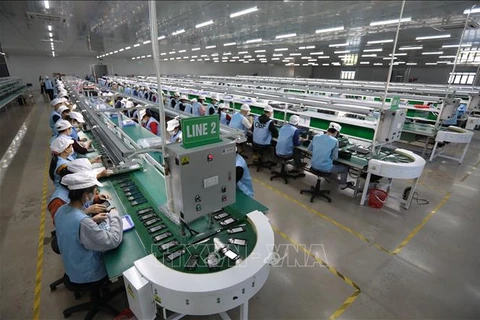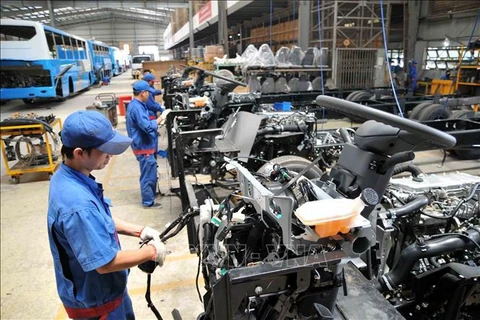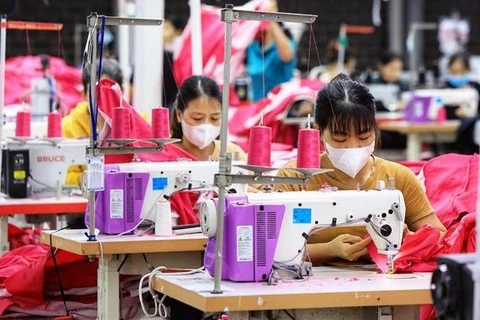Hanoi (VNA) – Amid global uncertainties, the continued maintenance of macro-economic stability will form an important foundation for Vietnam to achieve next year’s growth target, said General Director of the General Statistics Office (GSO) Nguyen Thi Huong.
In an interview granted to the Vietnam News Agency, she highlighted the positive trend in the country’s socio-economic situation in 2023 as seen in macro-economic stability, controlled inflation, guaranteed major balances, and many areas reaching set targets, making Vietnam a silver lining in the economic situation in the region and the world.
Despite global economic uncertainties, the Vietnamese economy has still maintained growth this year, with improvements recorded quarter over quarter – 3.41% in Q1, 4.25% in Q2, 5.47% in Q3, and 6.72% in Q4. As a result, the gross domestic product (GDP) in 2023 has increased 5.05% compared to 2022, she noted.
Meanwhile, latent risks posed by the global economy are predicted to remain in 2024 and continue negatively affecting the recovery prospect of Vietnam’s economy.
In the country, traditional impetuses are still weak while new ones remain unclear. Therefore, the economy is forecast to continue facing an array of difficulties and challenges next year. Impact from the world’s economic downturn since the COVID-19 pandemic will also keep affecting the Vietnamese economy, at least during the first half of 2024 before more positive signs are recorded, Huong analysed.
The official held that growth drivers for next year include the continued expansion of the agro-forestry-fishery sector; public investment, especially in infrastructure; foreign direct investment (FDI) attraction; and the service sector, which will be boosted by strong tourism recovery.
Other impetuses include trade and domestic consumption promotion policies that will help maintain growth in such sectors as air transport, wholesaling and retailing, accommodation, hospitality, financial, and tourism services.
Besides, the maintained stability of non-market services, inflation kept at a reasonable level, industrial and employment recovery, and salary reform will also support domestic consumption, she opined.
 GSO General Director Nguyen Thi Huong speaks at a press conference held on December 29 to unveil socio-economic statistics of Q4 and 2023. (Photo: VNA) The official went on to say that as 2024 is crucial for the realisation of the economic targets for 2021 - 2025, the Government, ministries, sectors, and localities will exert all-out efforts. Amid global uncertainties, the continued maintenance of macro-economic stability will provide an important foundation for Vietnam to achieve next year’s growth target.
GSO General Director Nguyen Thi Huong speaks at a press conference held on December 29 to unveil socio-economic statistics of Q4 and 2023. (Photo: VNA) The official went on to say that as 2024 is crucial for the realisation of the economic targets for 2021 - 2025, the Government, ministries, sectors, and localities will exert all-out efforts. Amid global uncertainties, the continued maintenance of macro-economic stability will provide an important foundation for Vietnam to achieve next year’s growth target.
To reach growth targets for each quarter and the entire 2024, she held that it is necessary to keep economic, political, and social stability to enhance investors’ trust, properly control inflation, bring into play fiscal and monetary policies to facilitate businesses’ credit access, step up public investment, and tackle bottlenecks for the land, real estate, construction, tourism, and capital markets.
Huong also pointed out the need to cut or extend payment deadlines for taxes and fees, assist companies to seek new markets and make use of the signed free trade agreements, accelerate the negotiation and signing of new deals, and promote administrative procedure reform to create a favourable business environment.
Effectively implementing domestic trade promotion programmes, distributing goods via digital platforms, encouraging Vietnamese people to prioritise Vietnamese goods, modernising distribution systems in rural and mountainous areas, and stimulating domestic consumption demand are also important to fostering growth, according to the GSO leader./.
In an interview granted to the Vietnam News Agency, she highlighted the positive trend in the country’s socio-economic situation in 2023 as seen in macro-economic stability, controlled inflation, guaranteed major balances, and many areas reaching set targets, making Vietnam a silver lining in the economic situation in the region and the world.
Despite global economic uncertainties, the Vietnamese economy has still maintained growth this year, with improvements recorded quarter over quarter – 3.41% in Q1, 4.25% in Q2, 5.47% in Q3, and 6.72% in Q4. As a result, the gross domestic product (GDP) in 2023 has increased 5.05% compared to 2022, she noted.
Meanwhile, latent risks posed by the global economy are predicted to remain in 2024 and continue negatively affecting the recovery prospect of Vietnam’s economy.
In the country, traditional impetuses are still weak while new ones remain unclear. Therefore, the economy is forecast to continue facing an array of difficulties and challenges next year. Impact from the world’s economic downturn since the COVID-19 pandemic will also keep affecting the Vietnamese economy, at least during the first half of 2024 before more positive signs are recorded, Huong analysed.
The official held that growth drivers for next year include the continued expansion of the agro-forestry-fishery sector; public investment, especially in infrastructure; foreign direct investment (FDI) attraction; and the service sector, which will be boosted by strong tourism recovery.
Other impetuses include trade and domestic consumption promotion policies that will help maintain growth in such sectors as air transport, wholesaling and retailing, accommodation, hospitality, financial, and tourism services.
Besides, the maintained stability of non-market services, inflation kept at a reasonable level, industrial and employment recovery, and salary reform will also support domestic consumption, she opined.
 GSO General Director Nguyen Thi Huong speaks at a press conference held on December 29 to unveil socio-economic statistics of Q4 and 2023. (Photo: VNA)
GSO General Director Nguyen Thi Huong speaks at a press conference held on December 29 to unveil socio-economic statistics of Q4 and 2023. (Photo: VNA) To reach growth targets for each quarter and the entire 2024, she held that it is necessary to keep economic, political, and social stability to enhance investors’ trust, properly control inflation, bring into play fiscal and monetary policies to facilitate businesses’ credit access, step up public investment, and tackle bottlenecks for the land, real estate, construction, tourism, and capital markets.
Huong also pointed out the need to cut or extend payment deadlines for taxes and fees, assist companies to seek new markets and make use of the signed free trade agreements, accelerate the negotiation and signing of new deals, and promote administrative procedure reform to create a favourable business environment.
Effectively implementing domestic trade promotion programmes, distributing goods via digital platforms, encouraging Vietnamese people to prioritise Vietnamese goods, modernising distribution systems in rural and mountainous areas, and stimulating domestic consumption demand are also important to fostering growth, according to the GSO leader./.
VNA

























